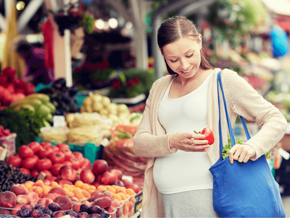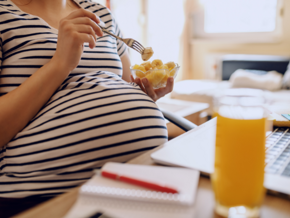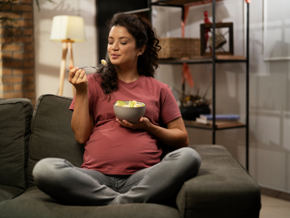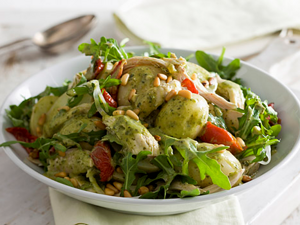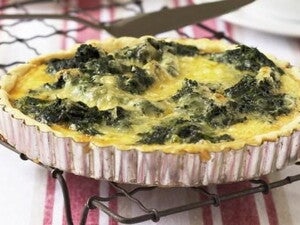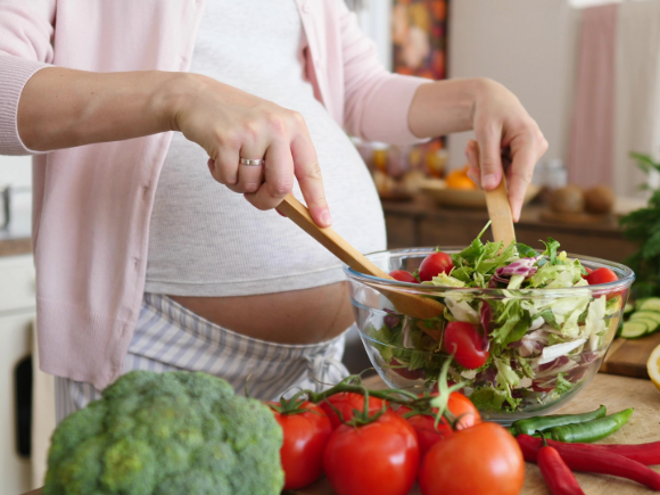
As you’re waiting to bring your little one into the world, learn to eat a balanced diet. By planning your nutrition carefully, you can make sure you and your baby get the essential nutrients needed for well-being now and in the future.
Pregnancy nutrient – folate (or folic acid)
Folate is essential for the healthy development of your baby in early pregnancy. You need to increase your folate (or folic acid, the form added to foods or in supplements) intake if you are planning a pregnancy or are pregnant. It’s a particularly important vitamin for your little one’s nervous system development. Folic acid during pregnancy helps prevent neural tube birth defects such as spina bifida – a defect where the baby’s spinal cord doesn’t fully fuse together and can result in a range of disabilities that can be severe.
How much folate during pregnancy is enough?
You need 600 micrograms (µg) per day of dietary folate during your pregnancy. You may be able to achieve this by eating foods that naturally contain folate,) however it is routinely recommended that women take a supplement containing 400 micrograms of folic acid at least a month before conceiving and during the first trimester. Consult your doctor or dietitian for advice if you don’t feel your dietary intake is meeting what you and your baby need.
What foods contain folate?
- Bread (most bread in Australia has added folic acid);
- Oranges;
- Green leafy vegetables;
- Folate enriched cereals;
- Fruit juices with added folate;
- Legumes;
- Nuts;
- Yeast extract (e.g. vegemite)
Tips for getting enough folate during pregnancy
Extended cooking can destroy or reduce the amount of folate available so take care when preparing your vegetables.
Pregnancy nutrient - Vitamin D
Vitamin D is essential for healthy bone structure and maintenance of teeth, as it helps you absorb calcium from the diet. Your vitamin D levels during pregnancy can affect your baby so preventing vitamin D deficiency is important.
How much vitamin D during pregnancy is enough?
During pregnancy, you will need 5 micrograms (µg) of vitamin D every day. While some foods will contain vitamin D, you will only meet your vitamin D needs through regular exposure to sunlight. If you have little access to sunlight speak to your doctor or dietitian for advice on supplementation.
What foods contain vitamin D?
- Vitamin D enriched margarine;
- Fatty fish like salmon; or mackerel;
- Eggs.
Tips for getting enough vitamin D during pregnancy
- Go for a walk in sunshine to get your vitamin D – all you need is 15-30 minutes, 2-3 times per week;
- Make sure you protect yourself with sunscreen and a hat and avoid peak UV times (10am – 3pm).
Pregnancy nutrient - Iron
Iron contributes to the normal formation of red blood cells and helps to bring essential oxygen to your body’s cells and to those of your baby. Iron has a number of important roles in pregnancy, including:
- Reducing the risk of developing anaemia which causes you to feel tired and breathless;
- Helping with normal energy production to help avoid fatigue;
- Supporting your immune system;
- Supporting brain development in your growing baby.
How much iron during pregnancy is enough?
You need 27 mg/day during pregnancy.
Good sources of iron include meat (especially red meat which is higher in iron than chicken and fish), egg yolks, legumes and nuts, leafy green vegetables and iron enriched cereals.
The iron found in animal food sources like red meat is easier to absorb whereas the iron found in plant sources like vegetables is less easily absorbed. When you are eating these plant sources of iron, adding vitamin C to the meal can help with the absorption of iron.
What foods contain iron?
- Include lean meats (especially red meats) at lunch and dinner;
- Choose green leafy vegetables;
- Choose wholegrain breads and cereals as they are higher in iron;
- Include legumes (dried beans, peas and lentils) in dishes like casseroles and soups;
- Yeast;
- Wheat germ;
- Roast beef;
- Cooked lentils.
Tips for getting enough iron during pregnancy
- If you are a vegetarian or vegan, you may want to discuss this with your healthcare professional as you may need additional supplementation if you are not getting what you and your baby need through your diet;
- To boost iron absorption, consume some vitamin C at the same meal. Fruits and vegetables that are good sources of vitamin C include oranges, kiwifruit and green leafy vegetables;
- Tea and coffee interfere with iron absorption. Limit how much you drink especially around meal times;
- Sprinkle salads and raw vegetables with yeast or wheat germ (1 tsp yeast provides an extra 2mg iron and 2Tbsp wheat germ provides an extra 1mg).
Pregnancy nutrient - Iodine
Iodine is a mineral found in plant and animal foods. Due to changes in the food supply and varying levels of iodine in soil in different parts of Australia, dietary intake of iodine can vary. Iodine is important for the physical development of your baby, brain function, and plays a role in metabolism throughout our lives. During pregnancy, women have higher iodine requirements.
How much iodine during pregnancy is enough?
In Australia it’s recommended that women trying to fall pregnant, or who are pregnant, or breastfeeding, should take an iodine supplement of 150 micrograms (µg) a day to ensure adequate intake. As with all supplementation discuss with your healthcare professional before starting.
What foods contain iodine?
Here are some iodine rich foods to think about including in your diet:
- Use iodised table salt at home;
- Wholegrain bread;
- Seafood - including canned salmon, tuna;
- Seaweed like nori;
- Eggs;
- Commercially made bread (with fortified iodine).
Tips for getting enough iodine during pregnancy
The Australian government has implemented mandatory fortification of bread with iodine to ensure adequate intake across the population. All commercially produced bread in Australia must be made with iodised salt, which helps increase iodine levels in the diet.
Pregnancy nutrient - Protein
Proteins are the number-one building block for your growing baby’s muscles, ligaments, hair, fingernails, bones, brain tissue, blood and other tissues. It’s also important for building your baby’s cells, and renewing your own cells.
How much protein during pregnancy is enough?
You need about 60 g/day of protein. Try eating 100-150 g of meat or fish or two eggs every day, plus three to four portions of dairy products (e.g. a glass of milk, tub of yoghurt, portion of cheese).
What foods contain protein?
Good sources of protein include:
- Meat;
- Fish;
- Eggs;
- Milk and dairy products;
- Legumes (e.g. soybeans, lentils, beans);
- Nuts and seeds.
Tips for getting enough protein during pregnancy
- Alternate your animal proteins: have fish one day, meat the next and eggs the day after that. Variety is the key to getting what you and your baby needs;
- Consume vegetable proteins daily;
- If your meal doesn’t include meat, have rice and lentils, or couscous and chickpeas;
- If you are a vegetarian, make sure you consume enough eggs and dairy products;
- Vegans may find it harder to meet their protein needs. Consult a dietitian or doctor for specific dietary advice.
Pregnancy nutrient - Omega 3 DHA fatty acids
Also known as ‘good fats’, DHA omega-3 fatty acid is an important fatty acid that contributes to your baby’s brain and eye development.
How much omega 3 DHA during pregnancy is enough?
During pregnancy, you will need 115mg per day.
What foods contain omega 3 DHA?
Omega-3 DHA fats are found in:
- Fatty fish (e.g. mackerel, sardines, tuna, salmon);
- Other seafood (e.g. cooked crab, calamari, lobster, scallops).
Tips for getting enough omega 3 DHA during pregnancy
- Eat fatty fish once or twice a week;
- Choose small, fatty fish, such as sardines, mackerel and herring. They are less likely to contain higher concentrations of mercury, which can be harmful to your baby;
- If you have any concerns your diet is not providing what you and your baby need consult the expertise of a dietitian regarding supplementation.
Pregnancy nutrient - Calcium
Calcium is necessary for the development and maintenance of the skeleton. It also assists with the functioning of neuromuscular and cardiac function. To stop your body’s reserves from being depleted, it’s important to get plenty throughout your pregnancy to:
- Keep your bones and teeth strong;
- Reduce your risk of osteoporosis and bone fracture.
How much calcium during pregnancy is enough?
You need to consume around 1000 mg/day. You can get this amount from having two and a half serves of dairy every day.
One serve =
- 1 cup of cow’s milk or calcium enriched soy milk;
- ½ cup evaporated milk;
- 200g yoghurt; or
- 40g cheese.
These foods can be high in saturated fat so opting for reduced fat varieties where possible is recommended.
What foods contain calcium?
- Dairy foods (the main source);
- Calcium enriched soy products like soy milk or soy yoghurt;
- Sardines or pink salmon with the bones;
- Breakfast cereal that has added calcium;
- Custard.
Tips for getting enough calcium for pregnancy
- Add milk or milk powder to dishes like casseroles or soups;
- Add cheese to pasta and vegetables;
- Use yoghurt in dips and dishes like curries;
- Vary your sources of calcium;
- Try sprinkling parmesan over your pasta;
- Add a little milk to your mashed potatoes, pureed vegetables, etc.;
If you don’t eat dairy products, your doctor may prescribe a vitamin supplement, or consult a dietitian to alter your diet to meet your needs.
Frequently asked questions about pregnancy nutrients
What nutrients does a pregnant woman need?
During pregnancy, a woman needs essential nutrients to support her health and the baby's development. Key nutrients include folic acid for neural tube development, iron for increased blood volume, calcium for strong bones, and omega-3 DHA for brain growth. A balanced diet rich in fruits, vegetables, whole grains, lean proteins and dairy can help meet these needs.
What are the nutrient goals for pregnancy?
The National Health and Medical Research Centre of Australia (NHMRC) sets the recommended daily intakes of each pregnancy vitamin and mineral. It’s so important to meet all of your nutrient needs during pregnancy, and where your diet may be lacking, you can find vitamin and mineral supplements to help you. Talk to your doctor or dietitian about which nutrients you need to focus on during your pregnancy.
What vitamins should I be taking when pregnant?
During pregnancy, it's essential to get all the vitamins and minerals you need to support your pregnancy. There are a number of key vitamins to focus on during pregnancy, including Folic Acid (to help prevent neural tube defects and support the baby's brain and spinal cord development); Iron (to support increased blood volume and prevent anaemia); Calcium (to help build baby's bones and teeth and maintain mum's bone health); Vitamin D (to aid calcium absorption and support bone health for both mum and baby); Omega 3 DHA (for healthy brain development in the foetus); and Iodine (for brain function and healthy growth). If your diet is not sufficiently including these nutrients, you may need to look at supplementation. Talk to your doctor or dietitian for tailored advice on which pregnancy vitamins are important for you.
When to start taking vitamin D during pregnancy
It is generally recommended that women begin taking vitamin D supplements as soon as they confirm their pregnancy. However, it is difficult to know when you will fall pregnant, so it may be appropriate to start taking vitamin D supplementation as soon as you starting trying to get pregnant. Adequate vitamin D levels are essential for both maternal health and foetal development, particularly for bone health and immune function. The recommended daily intake of vitamin D during pregnancy is 5 micrograms (µg). However, some women may require higher doses based on their individual health needs or if they have low vitamin D levels. It’s important to talk to your doctor to determine your appropriate dosage and to discuss any specific concerns regarding vitamin D supplementation during pregnancy.
How much folic acid should I take
During pregnancy, it is recommended that women take 400 micrograms (µg) of folic acid daily. This is crucial for preventing neural tube defects and supporting the healthy development of the baby's brain and spinal cord. It's best to start taking folic acid at least one month before conception and continue throughout the first trimester. Talk to your doctor if you have a history of neural tube defects or other specific health concerns, as they may recommend a higher dose.
Sources
NHMRC Eat For Health Website. Accessed at Nutrient Reference Values | Eat For Health

